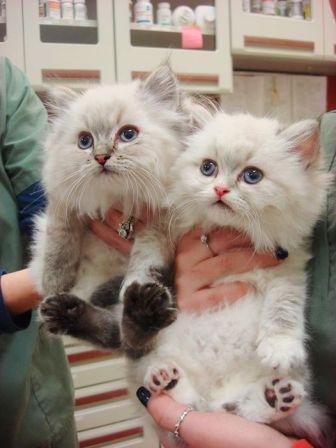
Chloe’s and Carson’s first kitten visit with Dr. Kate McDermott.
Dr. McDermott examined these cute kittens from the tip of their noses to the end of their tails!
First Vet Visit
Kittens have their own unique needs that are different from other pets and people. It’s very important that kittens (or puppies, for that matter!) see a veterinarian for a physical exam at around 6-8 weeks old. This first visit, the veterinarian will check them from nose to tail, which entails examining the ears, teeth and mouth, eyes, testing muscles and joints for mobility, combing the fur for evidence of fleas and listening to the heart and lungs to make sure everything is developing and functioning normally. The first vet visit is a great time for you to ask questions you have about what your pet needs from you in order to be healthy.
Vaccines
Part of your new kitten’s wellness program is vaccinating against diseases caused by certain viruses and bacteria. Vaccines are a safe way to keep your pet from contracting some terrible illnesses. They will be given over the course of a few visits to protect against feline viral rhinotracheitis, calicivirus, panleukopenia, feline leukemia virus, and rabies.
Parasites
Parasites are organisms that live inside your pet and feed off of them, such as roundworms. These can cause coughing, weight loss, potbellied appearance, and they are very common among kittens, as they can be passed from mother to kitten.
Spay or Neuter
If your kitten has not been spayed or neutered, it’s time to start planning for the procedure. Here are some of the benefits of spaying or neutering:
- Spaying your female cat helps prevent uterine infections and mammary gland tumors, which can be fatal in about 90 percent of cats, which means that spaying can lead to a longer, healthier life.
- Spaying your female pet prevents unwanted litters.
- Your spayed female won’t go into heat.
While cycles can vary, female felines usually go into heat four to five days every three weeks during breeding season. In an effort to advertise for mates, they’ll yowl and urinate more frequently—sometimes all over the house! - Your neutered male will be much better behaved. Non-neutered cats may mark their territory by spraying strong-smelling urine all over the house. Altered animals are less likely to bite. They are generally calmer and more even-tempered.
- It is cost-effective.
The cost of your pet’s spay/neuter surgery is a lot less than the cost of having and caring for a litter later. Neutered pets are also less motivated to escape, roam, get into fights, and so on. As a result, there are likely fewer future costly veterinary problems that your pet will face! - Spaying and neutering your pet is good for the community.
Stray animals pose a real problem in many parts of the country. They can prey on wildlife, potentially altering the local ecologic balance. Spaying and neutering is the strongest method we have in reducing the number of animals on the streets. - Spaying and neutering helps fight pet overpopulation.
We look forward to meeting your kitten! Schedule your appointment with us today!


